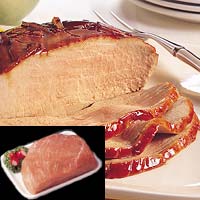
A-Z Indexes Food Health Guides
Health News |
Pork Roast VarietiesThe tender center loin roast (also called center rib roast) contains bones, which give it a tasty flavor but make it harder to slice. Your butcher can remove the backbone and transform this roast into rack of pork or crown roast of pork. Pork Tenderloin RoastThe pork tenderloin is a completely boneless strip of muscle and is considered the leanest and most tender pork roast; it is also the most expensive. Pork Blade RoastThe blade roast, an economical cut, is available either bone-in or boneless, and is lightly marbled with fat. Pork blade roast is also known as pork loin rib end. Boston ButtSometimes called pork shoulder roast, Boston butt is available either boneless or bone-in. It makes a somewhat fatty but economical roast. Pork Picnic ArmPork picnic arm is a fatty, bony cut, and is often barbecued. Copyright © 2026 TraceGains, Inc. All rights reserved. Learn more about TraceGains, the company. The information presented in the Food Guide is for informational purposes only and was created by a team of US–registered dietitians and food experts. Consult your doctor, practitioner, and/or pharmacist for any health problem and before using any supplements, making dietary changes, or before making any changes in prescribed medications. Information expires December 2026. |
